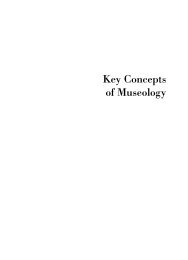ISS 25 (1995).pdf - The International Council of Museums
ISS 25 (1995).pdf - The International Council of Museums
ISS 25 (1995).pdf - The International Council of Museums
Create successful ePaper yourself
Turn your PDF publications into a flip-book with our unique Google optimized e-Paper software.
and its plurality. Continuing on the discussion o f<br />
community she states that it is necessary to<br />
identify to which community we a r e referring to when<br />
proposing the museological action. Museum and<br />
community are relative concepts, the first one is<br />
promoting the capacity <strong>of</strong> the museological<br />
community, the second one requiring a high degree <strong>of</strong><br />
participation and the third one implying that search<br />
for knowledge must be done in the communities<br />
themselves.<br />
Nicola Ladkin from Museum <strong>of</strong> Texas Tech<br />
University from Lubbock, USA , in her paper '<strong>Museums</strong><br />
and Communities: an ecological approach' examines<br />
museum as a species within its natural environment<br />
and community as synonymous with ecosystem. She<br />
establishes the term 'museum ecology' and specifies<br />
that it investigates the relationship between<br />
museums, community, ecosystems and global natural<br />
environment . <strong>Museums</strong> are a complex species tied in a<br />
great web <strong>of</strong> diverse spatial. physical and communal<br />
interrelationships. Cultural forces as history,<br />
politics. law and transferral <strong>of</strong> knowledge operate<br />
within the community ecosystem in the same way as<br />
environmental forces. <strong>Museums</strong> are unfinished<br />
institutions. they are in evolution. <strong>Museums</strong> can<br />
change their behaviour to better operate in their<br />
community. An understanding <strong>of</strong> community dynamics<br />
assists museologists to develop organization and<br />
management . This approach is very useful for the<br />
understanding <strong>of</strong> the relation between museum and<br />
community.<br />
Haria de Lourdes Horta, from Brazil. in her<br />
paper '<strong>Museums</strong> and Communities: a powerful<br />
equation, , ' states that at the present time there is<br />
nothing more 'museological' than this subject theme.<br />
Conflicts between indigenous and dominant cultures<br />
are the conflicts <strong>of</strong> power. <strong>The</strong> power in museumcommunity<br />
relationship means the control <strong>of</strong> mental<br />
territories. <strong>Museums</strong> have the role in this conflict.<br />
She explains the problem <strong>of</strong> identity in Brazilian<br />
cultural melting pot by some examples from the<br />
southern region <strong>of</strong> the country with the population<br />
<strong>of</strong> previously European origin. Through the<br />
interpretation <strong>of</strong> three case studies, one finished,<br />
one in due course and one in the early stage <strong>of</strong> the<br />
project she explains the notions <strong>of</strong> heritage.<br />
identity amnesia, heritage education and cultural<br />
power. She states that museology can be a tool to be<br />
empowering people in their daily fight to survive.<br />
It appears the most important to learn how to share<br />
museum power with community needs. It is the<br />
challenge for the museum world today.<br />
Jean Trudel, from the University <strong>of</strong> Montreal in<br />
Canada. in his paper '<strong>Museums</strong> and cultural<br />
13
















